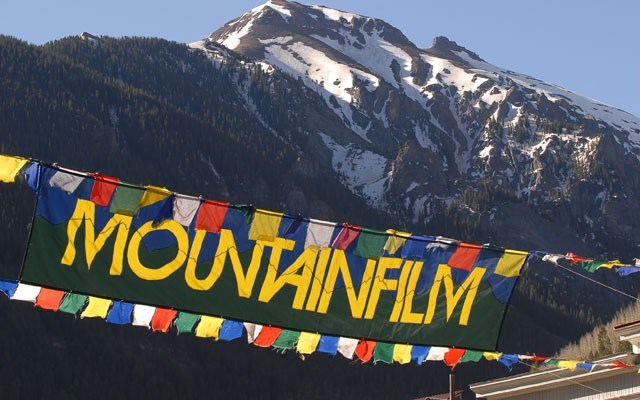Like the prayer flags that flutter at the many venues of Mountainfilm at Telluride, this year's four-day festival had many colourful themes, some bold and others subtle. No one person can absorb it all. Breaking and mending were the strongest themes I detected.
A crowd favorite was DamNation. A film about the damming of rivers, it was shown four times and with strong attendance. The central contention of the film is that dams inflict great physical and ecological damage. That's hard to dispute. The treasured Glen Canyon was lost to create Lake Powell, and the great dams of the Columbia River have blocked the epic spawning runs of salmon. Targeted in particular were four dams on the Snake River, which originates in Jackson Hole and has carved our wonderful but now plugged canyons in Idaho.
Those dams need to be broken, the filmmakers say.
In Emptying the Skies, songbirds of the Mediterranean are threatened, the population rapidly on the way to being broken by poachers. In one passage, a woman rationalizes that killing the birds for profit is OK, because she kills just five. Seeking to mend this situation are bird-lovers, the subject of the film. The moral is that the efforts of a few people, fully committed, can make all the difference.
A more global problem is explored in The Seeds of Time, a film about the work of Cary Fowler, a scientist from Memphis, Tenn., whose mission has been to protect the genetic plant diversity of the last 12,000 mostly ice-free years. Fowler, who was in Telluride, explained that there are, for example, 200,000 varieties of rice.
In this time of big agriculture, we have discarded much of the vast genetic diversity of potatoes, rice and many other foodstuffs. Having just a few varieties of wheat, for example, leaves us vulnerable if pathogens figure out how to destroy those few varieties.
Our food system is broken.
Fowler, working with other scientists, has established what he calls a "repository of options for the future." Seeds from around the world are stockpiled and archived in the interior of a mountain located on a Norwegian island in the Arctic Circle, safeguarded for a time of future need.
My interests in energy led me to films about the drilling fields of North America. One set of films, called Dear Governor Hickenlooper, explored the explosive drilling for natural gas and oil in Colorado. The central contention is that our laws are broken in giving neighbours of such drilling so few rights. In one scene, a young family in their dream home in the country is confronted with a drilling operation across the gravel road that drives them to their basement and fills them with dread about the long-term impact of exposure to chemicals used in drilling.
More moving yet, but for different reasons, was a story from North Dakota's Bakken oil fields. Williston is the largest boom city there, job seekers from across the country drawn to the prospect of big-money jobs. That story has been well told.
The Overnighters tells the story of some people, mostly men, many of them older or from more dark or at least desperate situations, who can find no place to stay once they get to Williston.
In response, Jay Reinke, the pastor of a local Lutheran church, persuades his congregation to allow the homeless men, 1,000 of them over the course of two years, temporary or longer quarters in the church.
If that is, on the face of it, an act of Christian charity, some church members confide to the filmmaker that they have trouble with the imposition. "This is not my home anymore, and it's very difficult for me," says one, speaking of Williston altogether but, it seems, the church, too. City officials also have problems.
"I don't see how a community can simply turn its back on people who have no place to sleep," says Reinke.
But also this: "It's a very broken world. Everyone is broken."
Among those broken people is the pastor himself, a revelation that adds further drama to an already rich movie.
Premiered at Sundance in January, The Overnighters is a superb piece of documentary filmmaking. It was also extremely low budget. Jesse Mosse, the filmmaker, explained that once a month he travelled from San Francisco to North Dakota and, in Williston, slept on a cot in a hallway along with the other desperate men. His film got my vote for best film of Mountainfilm. There was not one mountain in it.
Wilderness was an overt theme of this year's festival. But at a breakfast, several of those involved in the trenches of preserving wild land and ecosystem on a global basis warned against issuing visions from the mountain top. Instead, when working in places like Africa and Latin America, they said, the concept of human rights must be integrated into wilderness.
Said Vance Martin, president of the WILD Foundation "Don't be a savior, be a partner."




